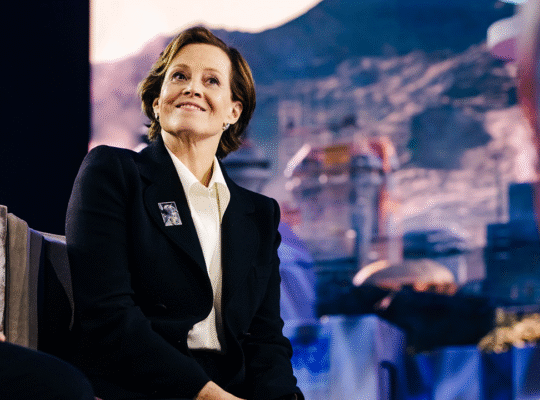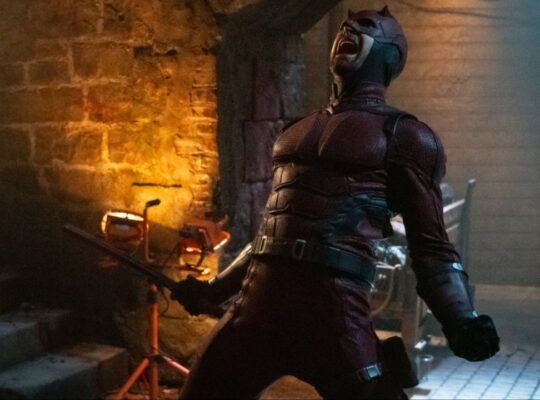It takes a couple of episodes to acclimate to writer, creator, and executive producer Charlie Covell’s contemporary yet highly stylised interpretation of Ancient Greek mythology in Kaos. The eight-episode series takes place across three planes of existence – Mount Olympus, the Greek island of Crete, and the Underworld – where an epic prophecy threatens the power Zeus (Jeff Goldblum) has over humanity and the immortality of his divine family. In Kaos’ anachronistic world, ancient rituals, human sacrifice, and bloodsport are still in fashion, but you can also choose from an array of God-themed cereals at the grocery store and pick up falafel from a food truck.
Save for the classical names of gods, tragic heroes, nymphs, and other mythical figures on screen, however, there is little that looks or sounds particularly Greek about Kaos. The soundtrack is rife with rock, pop, and showtune needle drops from Dire Straits, The Temper Trap, ABBA, and the Wizard of Oz. Shot in Malaga, Spain, and with an abundance of U.K., Irish, and American accents in the sound mix, the Cretan scenes feel more like spring break on the expat-infested Spanish Riviera. Maybe that was the intention.
It wouldn’t be new for a UK production to Anglicanize stories inspired by classical antiquity or religious doctrine either – here’s looking at you Atlantis, Rome and Good Omens. But the oversaturated cinematography and cheap, tacky-looking production design of both Kaos’ earthly realm and tracksuit-loving Zeus’s heavenly villa (complete with inflatable pink flamingos, gold jewelry, and a staff dressed like ball boys at a 1980s tennis tournament) dampens the epic stakes. As does the dry humor that Covell once wielded to success in End of the F**king World but here rarely raises a laugh and extinguishes much of the passion that fuels these legends.
Season 1 revolves around Eurydice, a.k.a. Riddy (Aurora Perrineau), Ariadne a.k.a. Ari (Leila Farzad), and Caneus (Misia Butler), three humans whose fates are joined by the aforementioned prophecy. Their characterizations of these mythical figures have been given a refreshing retcon: Riddy, for example, is no longer the damsel-in-distress who Orpheus (Killian Scott, whose character is refashioned as a tragic pop star) will journey to the Underworld to rescue. Instead, she’s his unsatisfied wife and a lost daughter who finds purpose in death. By episode 2, Riddy is enlisted to work in the “Centre for the Unresolved” – a workplace for humans who can’t be “renewed” (read: reincarnated) because they were buried without coins. It’s in this brutalist, black-and-white afterlife that she connects with fellow employee Caneus, and together they slowly discover the gods’ secrets about the hereafter. He’s a sweet soul who loves his three-headed working dog (a nod to Cerberus, guard-canine of hell) and has a mysterious backstory that’s ultimately revealed in a considerate fashion tying into both Butler’s background as a trans man and Caneus’ mythical inspiration.
Elsewhere, guilt-ridden Ari takes top billing from Athenian Theseus to become the protagonist in a storyline inspired by the legend of King Minos (Stanley Townsend) and his infamous Minotaur (Fady Elsayed). But where Covell neatly erases the taboo subject of rape in Caneus’s backstory, the removal of bestiality in the Minotaur’s origin storyline is twisted into something far more convoluted for Ari to deal with.
There’s a pretty bland love triangle shoehorned in midseason between Riddy, Orpheus, and Caneus. As much as Scott delivers on soft boy Orpheus’s questionable “nice guy” status and Perrineau nails Riddy’s marital dissatisfaction and frustration with her fate, her chemistry with even softer-boi Butler is as monotone as the Underworld’s color palette. A juicier romantic triptych involving Hera (Janet McTeer), Poseidon (Cliff Curtis), and Zeus is far more enjoyable and volatile. Zeus is a petty bitch, so keeping their affair secret raises the heat in the final stretch of the season as his paranoia towards his family and humanity intensifies into genocidal territory.
Showing the tempestuous and remorseless nature of the Greek gods, regardless of where they rule from, is a series strength. Goldblum – offering a performance not too dissimilar to his portrayal of The Grandmaster in the Marvel Cinematic Universe – punctuates Zeus’ infantile narcissism with some real moments of menace. When he lowers his voice an octave in anger, the air is sucked out of the scene. He and Curtis showcase the insecure crassness of new money while McTeer plays Hera with an aristocratic air. But like Zeus, she revels in the coldhearted ruthlessness and brutality she wields to retain her seat of power. Her priestesses must chop off their tongues in order to follow her, and in a shocking second-episode scene, she induces the birth of Zeus’s illegitimate “half-breed” child, demands he kill the baby, and turns the mother into a bee for her hive. Not to be outdone, Zeus physically abuses his son, the god of wine and desire Dionysus (played with cheeky earnestness by Nabhaan Rizwan) in episode 1. He opens fire on his ball boys in episode 4 and later tortures his world-weary brother Hades (David Thewlis). Disney’s Hercules, this is not.
There’s a gentleness to Thewlis’ overworked ruler of the Underworld and benevolence the god isn’t typically afforded in other, more antagonistic depictions. His realm too, is refreshingly depicted as a far less tortuous place. Presenting Hell and purgatory as a colorless, Kafkaesque industrial complex isn’t exactly novel, but it’s far easier on the eye than Kaos’ heavenly and Earthly realms.
Kaos is serving far too many competing characters and plotlines to do them all justice.
Covell has packed a diverse range of Greek myths and legends into their chaotic worlds. A charming Stephen Dillane plays Prometheus as a fourth-wall-breaking narrator. Rakie Ayola brings a fiery defiance to Persephone, Queen of the Underworld. Then there’s Debi Mazar’s no-nonsense Medusa, Billie Piper’s nervous wreck of a seer Cassandra, and the deliciously gender-fluid Fates played by Eddie Izzard, Ché, and Sam Buttery. But as Homer once wrote in The Odyssey, “If you serve too many masters, you’ll soon suffer,” and Kaos is serving far too many competing characters and plotlines to do them all justice. The result is eight hours of narrative excess ricocheting between intrigue and tedium, as it plods towards an un-thrilling finish line. And given Netflix’s unfortunate habit of canceling shows after just one season, Kaos may just be sent to the Centre for the Unresolved before season 2 can make good on its epic, prophetic promise.












